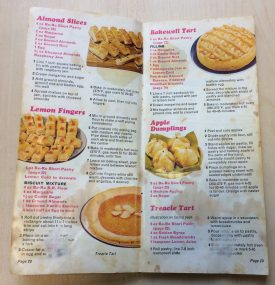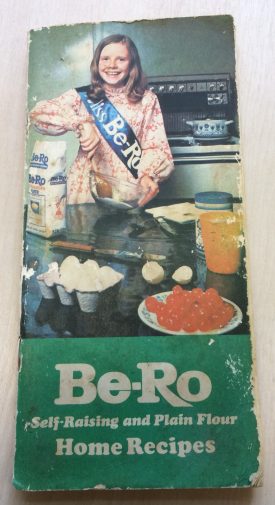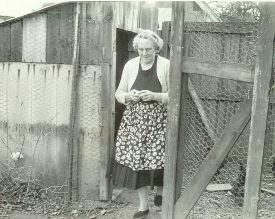I love food, I love to eat and I love to cook, so it is perhaps no surprise then, that when thinking of an object that connects me to the history of the county, the first thing that came to mind was my great aunt’s book of favourite family recipes.
From Lincolnshire to Warwickshire
I must confess, I am not from Warwickshire, but Lincolnshire. My time here has still seen me involved with food (Warwickshire County Record Office, where I work, seems to have a never-ending supply of cake!) and I like nothing better than visiting some of the small, homely cafés that seem to be common in Warwick. Just this act of visiting a chocolate shop, or buying a ham and cheese sandwich reminds me of this recipe book. Every time I consult this sticky tome, I am instantly transported back to her pine-panelled kitchen in 1970s Lincolnshire, with the tiled floor that froze my stockinged feet and huge (or so they appeared to me at the time) pans simmering on the stove. It must have been these early lessons in baking and jam-making that fostered my own interest in food and the joy I now get from feeding my loved ones hand-made goodies. In a way we are all still enjoying my great aunt’s culinary skills.
I love the connection this book represents to my past and people in it I didn’t even know. My great aunt would have learned her cookery skills from her mother, aunt or grandmother and whenever I recreate a recipe from the book, it’s nice to feel that they are all in the room with me, judging my efforts… kindly, I hope. Although some of the methods might have changed a little (I don’t have to spend 30 exhausting minutes creaming butter and sugar with a fork any more), I still try to use the same local ingredients they would have used.
Finding out about Warwickshire’s culinary history
Now that I am working in Warwickshire, I find the patchwork landscape of field and hedgerow very reminiscent of my expeditions in the Lincolnshire countryside when ‘brambling’ (picking blackberries) in the country lanes around Louth and Horncastle was an annual treat. Warwickshire is renowned for its greenery, so it’s good to find myself working in a county where I can feel so much at home.
I have less time for foraging in the wild these days, so the farm shops of Warwickshire have to substitute, but there is no shortage of lovely local produce with which to continue my jam and cake making! Farming has played a large part in Warwickshire’s history, so it’s good to see that, even as the towns and cities grow, there’s a space for the wide open fields and their historic names, the ridge and furrow, and the excellent quality produce.
I am continuing to explore our food heritage through my work at the record office, and have been delighted to find ancient recipe books and other food-related records to experiment with. This has led to an appearance with my colleague (and esteemed web editor!) Benjamin Earl on Radio 4’s Kitchen Cabinet to talk about Artichoke Pie, as well as some very pleasurable recipe testing for Warwickshire Museum’s new Heritage Afternoon Tea events. I’ve also spoken to other people about possible heritage cookery events. Will they happen? Never say never.
Childhood to present day
It’s great that my time in the county has enabled me to indulge my passion for all things foodie and I’m proud that my great aunt’s tatty, but treasured, cook book from Lincolnshire has led to such amazing Warwickshire adventures.










Comments
How lovely! I have my mother’s Be-Ro book. I recognised it immediately, even before I had scrolled down to the second picture – I think mine dates to soon after the war. It figures in my earliest memories of helping my mother in the kitchen, about 1950 perhaps. Full of frugal but serviceable recipes, – a number of steamed puddings which were a staple of our “dinner” times when my father would cycle home from work. They make the most of precious eggs and margarine as they used 50% more flour than a victoria sponge.
When I was eight we moved south and I don’t think we had Be-Ro after that. It was a Newcastle company, with another factory in Nottingham. The depot furthest south was Birmingham, so they probably didn’t deliver as far as Swansea. The making instructions always include (as did all other recipe books then) the instruction to break the eggs individually into a cup to avoid spoiling the mix if one turned out to be bad. Now I see eggs thrown away if they are past their best before date. I’m not sure if eggs were still on ration at the time. I remember (though I do remember occasionally having the rather grey dried eggs) that my mother found a woman in a village outside York who kept hens, and she would put me in the seat on the back of her bike to go and buy some.
I clearly remember fat coming off ration. The grocers shops has signs outside “The stork is coming back” and asking my mother what it meant. Until then cooking fat was sold in plain grease proof wrappings just printed with the basic government label.
Add a comment about this page